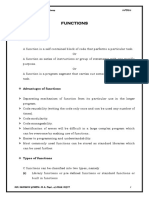1.structure of C++ Program:: A. Linkage
Uploaded by
kranthi6331.structure of C++ Program:: A. Linkage
Uploaded by
kranthi6331.
Structure Of C++ Program:
Programming Structure:
#include <header_file_name.h> #define constants_name <global variable declaration part> <int>or<void> main(args...) { local_variable_declaration; executable_part; } //sub programs or functions part. <data_type>function_name(args...) { function_coding; }
a. Linkage: Linkage refers to the linking of the header files.Header Files are nothing but,it contains the functions that we are going to use. Ex: #include <iostream.h> b.Declaration: Declaration refers to the declaration of user defined functions in that programs or global variables.global variables,once declared can be used in any function in that program. Syntax: <data_type> function_name(function arguments); Example: int Add(int,int); Syntax:<data_type> variable_name;
Example: int sum_of_numbers; // sum_of_numbers if the name of the variable declared as an integer type c.Definition: The definition part is used to define that function which we already declared in declaration part. Example: int Add(int x , int y) { return(x+y); } d.Main() Program: Main Program Part is used to write the programs and it is where all the userdefined functions or built-in function are called. syntax: int main(int argc,char *argv[]) Ex: int main() { int a;//variable declaration int b;//variable declaration int c;//variable declaration a=5; b=10; c=a+b; printf("a+b=%d",c); }
2.Difference Between C And C++
C and C++ are the magic spells of many programmers and software developers.Though C programming language is orgin of C++ there are many concepts which are include in C++ and very useful and easier to write programs.
Difference Between C and C++:
C Program
It is a Structural Program It Does not have any 'namespace' Not Strict Type Checking C++ functions cannot be used Declaration of Variables should only be at the beginning.
C++ Program
It is a Object Oriented Program Introduces A new Concept 'namespace' Strict Type Checking C function can also be used Declaration of variables can be done at any part of the program.
You might also like
- Hourglass Workout Program by Luisagiuliet 276% (21)Hourglass Workout Program by Luisagiuliet 251 pages
- The Hold Me Tight Workbook - Dr. Sue Johnson100% (16)The Hold Me Tight Workbook - Dr. Sue Johnson187 pages
- Read People Like A Book by Patrick King-Edited62% (66)Read People Like A Book by Patrick King-Edited12 pages
- Livingood, Blake - Livingood Daily Your 21-Day Guide To Experience Real Health77% (13)Livingood, Blake - Livingood Daily Your 21-Day Guide To Experience Real Health260 pages
- COSMIC CONSCIOUSNESS OF HUMANITY - PROBLEMS OF NEW COSMOGONY (V.P.Kaznacheev,. Л. V. Trofimov.)94% (212)COSMIC CONSCIOUSNESS OF HUMANITY - PROBLEMS OF NEW COSMOGONY (V.P.Kaznacheev,. Л. V. Trofimov.)212 pages
- Donald Trump & Jeffrey Epstein Rape Lawsuit and Affidavits83% (1016)Donald Trump & Jeffrey Epstein Rape Lawsuit and Affidavits13 pages
- The 36 Questions That Lead To Love - The New York Times94% (34)The 36 Questions That Lead To Love - The New York Times3 pages
- The 36 Questions That Lead To Love - The New York Times95% (21)The 36 Questions That Lead To Love - The New York Times3 pages
- Jeffrey Epstein39s Little Black Book Unredacted PDF75% (12)Jeffrey Epstein39s Little Black Book Unredacted PDF95 pages
- The 4 Hour Workweek, Expanded and Updated by Timothy Ferriss - Excerpt23% (954)The 4 Hour Workweek, Expanded and Updated by Timothy Ferriss - Excerpt38 pages
- Course Code: Scax1001 Course Name: Computer Applications in Business Chapter Name: C' Language Subject Coordinator: Mrs - Jancy - C LanguageNo ratings yetCourse Code: Scax1001 Course Name: Computer Applications in Business Chapter Name: C' Language Subject Coordinator: Mrs - Jancy - C Language20 pages
- Unit-3: Understanding The Scope of FunctionsNo ratings yetUnit-3: Understanding The Scope of Functions25 pages
- Structure-of-a-Simple-C-Program1-Data-Types-and-Input-Output-StatementNo ratings yetStructure-of-a-Simple-C-Program1-Data-Types-and-Input-Output-Statement58 pages
- C Program Internal-1 Question and Answer (2)No ratings yetC Program Internal-1 Question and Answer (2)19 pages
- C++ Interview Questions and Answers For Freshers pdf _ PrepInstaNo ratings yetC++ Interview Questions and Answers For Freshers pdf _ PrepInsta12 pages
- Module3 - Functions - PCD Notes C ProgrammingNo ratings yetModule3 - Functions - PCD Notes C Programming28 pages
- Table 3 Summary of On-Therapy Adverse Events: System Organ Class Preferred Term Placebo (N 3) Active (N 3)No ratings yetTable 3 Summary of On-Therapy Adverse Events: System Organ Class Preferred Term Placebo (N 3) Active (N 3)2 pages
- Create PDF With PDF4U. If You Wish To Remove This Line, Please Click Here To Purchase The Full VersionNo ratings yetCreate PDF With PDF4U. If You Wish To Remove This Line, Please Click Here To Purchase The Full Version2 pages
- Common C Programming Questions With SolutionsNo ratings yetCommon C Programming Questions With Solutions13 pages
- 3.preprocessors:: Name Function of The PreprocessorNo ratings yet3.preprocessors:: Name Function of The Preprocessor5 pages











































































































